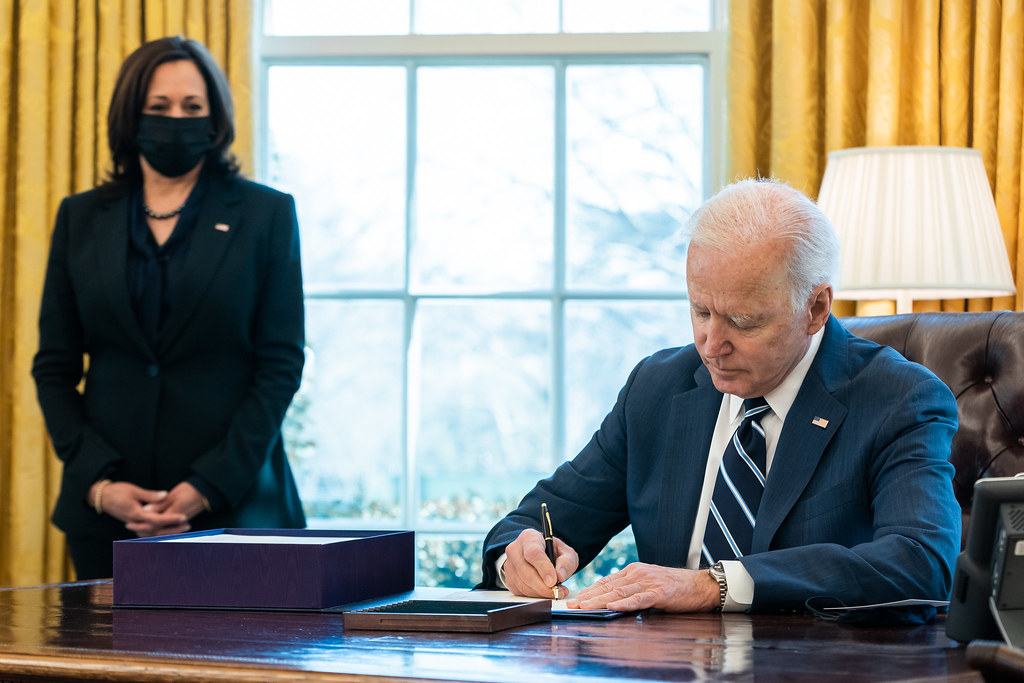Ending U.S. child care subsidies won’t restock store shelves, writes Sonali Kolhatkar. A fairer, more sustainable global economy might.

President Joe Biden, joined by Vice President Kamala Harris, signing American Rescue Plan Act of 2021 on March 11. (White House, Adam Schultz)
By Sonali Kolhatkar
Other Words
 Headlines are screaming that inflation is here to stay.
Headlines are screaming that inflation is here to stay.
U.S. consumer prices have risen by an average of 6.2 percent in the past year, the sharpest increase since 1991. Although Americans are supposedly — in the words of The New York Times — “flush with cash and jobs,” they are also deeply unhappy with the state of the economy.
It’s no wonder Republicans are thrilled and are drawing a line between inflation, public anxiety about the economy, and Joe Biden’s presidency.
What is surprising is that Biden himself is helping them by citing his administration’s achievement of putting more money into people’s pockets as part of the explanation for the current spike in inflation.
In a Nov. 10 speech, Biden said, “You all got checks for $1,400. You got checks for a whole range of things.” He went on to explain, “Well, with more people with money buying product and less product to buy, what happens? Prices go up.”
Support CN’s Winter Fund Drive!
The New York Post, a conservative paper, jumped on the speech, claiming that the president “concedes his Covid stimulus checks fueled [the] spike in inflation.”
But the paper downplayed Biden’s assertion that “the supply chain is the reason.”
In fact, the president led his audience through a fairly clear explanation of how globalization works. By artificially driving down the cost of goods for decades, this far-flung system is especially vulnerable to disruptions like the pandemic.
Global supply-chain crisis – this the port of Long Beach. This whole form of industrial organization really needs to go, for humanity and nature. pic.twitter.com/GIR4336HoI
— Doug Henwood (@DougHenwood) October 16, 2021
As Biden explained, “Products like smartphones often bring together parts from France, Italy; chips from the Netherlands; touchscreens from New York State; camera components from Japan — a supply chain that crosses dozens of countries.”
“That’s just the nature of a modern economy,” he concluded. But should it be?
Systematically Deregulated System

1999 anti-WTO protests in Seattle. (J.Narrin, CC BY 3.0, Wikimedia Commons)
The massive web of consumer manufacturing isn’t a fact of nature. It’s a systematically deregulated system designed by multinational corporations to minimize the cost of materials and labor — and maximize their profits. This was precisely what the anti-globalization movements of the 1990s were protesting.
When Biden said in his speech that you “have to use wood from Brazil” and “graphite from India before it comes together at a factory in the United States to get a pencil,” he didn’t reveal that pencil manufacturers might be relying on illegal logging in the Brazilian Amazon. Nor did he mention that transporting goods from far reaches of the globe generates massive carbon pollution.
Now this system is hurting consumers too. In fact, they’ve been feeling the pinch for years.
Go back to polls conducted even before the pandemic — including a Gallup poll from 2018 and the General Social Survey from 2019 — and one can find widespread malaise about the state of the economy.
In other words, Americans have spent decades being disappointed with the sustained suppression of wages and increasingly insecure jobs. This is a direct consequence of the offshoring and deregulation accelerated by corporate globalization.
But instead of drawing the connection, conservative Republicans are blaming pandemic assistance and other government help, as though ending child care subsidies could restock store shelves. Conservative Democratic Sen. Joe Manchin of West Virginia is making similar assertions to justify stymying Biden’s proposals to expand government assistance.
A better takeaway from our current economic situation is that there is nothing natural about being at the mercy and whims of an economy designed by corporate profiteers for corporate profiteers.
We need to make the global economy fairer and more sustainable — not pull up the few remaining supports for American families.
Sonali Kolhatkar is currently the racial justice editor at YES! Media and a writing fellow with Independent Media Institute. She was previously a weekly columnist for Truthdig.com. She is also the host and creator of Rising Up with Sonali, a nationally syndicated television and radio program airing on Free Speech TV and dozens of independent and community radio stations.She is the author of Bleeding Afghanistan: Washington, Warlords, and the Propaganda of Silence, and the co-director of the non-profit group, Afghan Women’s Mission. Watch her 2014 Tedx talk, “My journey from astrophysicist to radio host.” She can be reached at www.sonalikolhatkar.com
This article is from Other Words.
The views expressed are solely those of the author and may or may not reflect those of Consortium News.
Help Us Cover the Assange Case!
Support CN’s
Winter Fund Drive!
Donate securely with PayPal
Or securely by credit card or check by clicking the red button:


Greedy capitalist motivated production dispersions as Sonali hints only results in needlessly massive carbon footprints. Human need based rejigging of the global economy with higher regional socio-economic integration that doesn’t also wittle away fundamental political sovereignity of various regional states should be adopted as the alternative to the current economic lunacy misoperating at the global scale. So it would be very good for the United States to principally, if not also exclusively, stick to its own continental Three Amigoes to iron out its own domestic socio-economic problems.
All this is very good. Can we expect change? Communism was a proletariat revolution. We have been fighting it since 1919. One has not stopped to ask why? The Russians of 1913 would tell you. They who rule had cast it as a bad word, an evil replete with unimaginable horrors. Is it? I met an American years ago who fought in the Abraham Lincoln Brigade of the Spanish Civil War. He said communism had been betrayed. I understood his meaning that it had been turned in on itself by the same ruling elite that rules us now; the very idea is a threat to their existence. Change? It will never come until the public at large understands why things are the way they are.
The industrialism creation of proletariat was indeed a major event.
But what isn’t identified today is what has replaced it—the precariat.
Those living precarious lives–the precariat— have little of what provides–and probably what trumps all other needs—a sense of security. And this creates a dichotomizing of perspective because of fact that many still have memories of when it was possible to have a life-time job, being able to have assumed things like a guaranteed life of opportunity as a result of gaining an “advanced” education, and an identity based on heritage.
Insecurity is permeating every level of society and the mass of people similar to the way the formation of the proletariat had.
Today, understanding the precariat is what may be necessary to understand much of what is going on politically, economically and socially today.
The precariat are the mass of people that have been marginalized, and just about everyone has been so but in different ways, and if one thinks either democrats or republicans have the vision to correct this, I have a bridge for sale at a bargain price.
How surprising that Biden forgot to mention Chinese imports, from machinery, to furniture, to electronics, without which the manufacturing deficient US economy could not function for a day. Yet this Congress is united in its effort to pretend that the United States could or should “decouple” from the world’s largest economy without causing a complete economic collapse. The recent threats to cut out Russia from the Swift intrabank transfer system have accelerated discussion of an alternative financial system which would be less vulnerable, perhaps even immune, to US sanctions. If so, it would mark the end of the dollar as the world’s sole reserve currency, and the present financial system. Given the current trend in the West, to print up money art an unprecedented rate to paper over the $1.7 quadrillion in derivatives debt, we’ve the making for a financial blowout far greater than that of 2008-9.
It should have been fairly obvious to all – it was to me – that the pandemic had the potential to cripple the current neo-liberal economic paradigm. I can only address the US situation, as I’m too poorly informed of situations beyond these shores. So much of poor America as well as what has historically been referred to as “the middle class” had been living on the brink of financial insolvency for a very long time, only one illness or accident away from bankruptcy, if not indigent poverty.
The government checks to its citizens (let us not forget that Trump also deployed those checks as a campaign tactic) were meant to keep the wheels of profligate consumerism turning – the rhetoric deployed by the pols did little to disguise this fact. The fact that many recipients decided to say “Well – f#$k it!” those same pols should have anticipated, but the belief that the existential surrender to the wage slave construct was a permanent fixture? – that is classic hubris, the kind that makes up the skeleton of Francis Fukuyama’s “The End of History”.
“A better takeaway from our current economic situation is that there is nothing natural about being at the mercy and whims of an economy designed by corporate profiteers for corporate profiteers.” Indeed Sonali, the one word that best describes modern American economic life is: “predatory.”
All CN and Left writers are references “to be alert”!
Bottom-line thinking and acting without regard for society’s citizens — unfair taxation and inadequate financial regulation — create and propel this situation.
Absurdity at its pinnacle, was it the Trump administration or is it the Biden administration?
Neither, it is the failure of the U.S. govenrment that the two parties seem hell bent to expedite.
Is this what Catlin Johnstone refers to in her piece on the Guardian and Chinese Imperialism when she warns us to be alert?